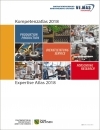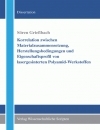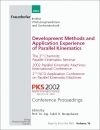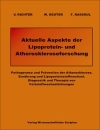| ||||
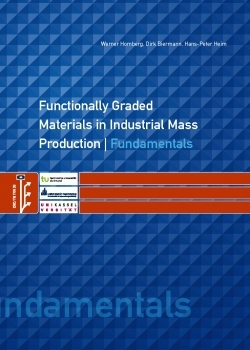
| ||||
|
Werner Homberg (Hrsg.)
Functionally Graded Materials in Industrial Mass Production Fundamentals
179 Seiten, mit Abb., 17 cm x 23 cm, Hard Cover ISBN: 9783942267922 Verlag Wissenschaftliche Scripten Due to the increasing importance of ecological and economic aspects, it will be necessary to make future production processes more energy-efficient and environmentally friendlier. With this objective in mind, the Collaborative Research Centre (CRC) Transregio 30 was founded in July 2006 and is currently in the second funding period. At present, in the CRC, 22 sub-projects are being supported by the German Research Foundation (DFG). In line with the Transregio principle, they are distributed among different locations, namely Dortmund, Kassel and Paderborn. A subtarget connecting all the sub-projects is to draw up basic principles for innovative hybrid thermomechanical production processes for metal and plastic forming. Through these new processes, it shall be possible to manufacture products with complex geometries and, at the same time, create tailor-made properties integrated within the process. In this way the manufacturing time is reduced and the efficiency of energy and material use can be increased. The key aspect at the centre of the new production processes is the functional gradation of the parts, which describes the targeted and reproducible adaption of the micro-structure of a material for adjusting macroscopic art properties such as the hardness or toughness. The target is to continuously course of the change of the microstructure in at least a spatial dimension. The combination of complex thermal and mechanical mechanism of action has enormous future potential with regard to modern industrial manufacturing processes and their freedom of design in the field of lightweight construction. Up to now, it has not been possible – or only inadequately – to produce such product structures with conventional means under economic conditions. The aim is therefore to achieve this by selectively controlled temperature distribution during forming with functional grading with a single material in a single step. This results not only in new forming processes, but also in new product properties as a result of the thermo-mechanical process sequence. For example, the micro-structure on the surface can differ from the structure inside the part, whereby a well-known example is the surface hardening of steel. One of the special properties of the Transregio 30 is the use of non-composite materials, so-called “mono materials” (Figure 1), both in the field of metals and polymers, because they are time and cost-effective and also environmentally friendly due to the ease of recycling. Consideration is given not only to features that can be directly derived from conventional materials technology research methodology, but also to those that are of special relevance in terms of grading, such as complex residual stresses, durability and vibration behaviour. The special relevance of the Transregio 30 thus lies in the control of the process conditions and in the prediction of the final micro and macro-structure for all materials through mathematical, statistical or numerical methods with the help of real, virtual or laboratory experiments. To gain a better understanding of this special topic of the Transregio 30, the authors have produced this work. It presents the main principles of the individual project areas so as to make it easier to understand previous and future findings on the production, influencing and/or prediction of the functional gradations of the parts. The results of the newly developed processes and methods are combined and presented in the Transregio 30 on the basis of technological demonstrators such as the flange shaft, crash box and interior door paneling. They demonstrate the possibilities of the functional gradation of steel, aluminium and polymers. This long-term research target makes an interdisciplinary listing of the Transregio 30 essential and is divided up into the following project areas: process design (A), material modelling, parameter identification, experiment, validation (B), numerical treatment (C) and process-accompanying product optimisation (D). For these project areas, the specific principles are listed in the respective chapters in the basic work. In the chapter on Production Technology for the Manufacture of Functionally Graded Parts (2), the main principles of the graded polymers, forming and machining technology, coatings and material characterisation from the areas A and B are described. The chapter on Simulation Technology (3) deals with the numerical principles that are used in the respective subproject from areas B, C and D. In the last chapter, Component Properties (4), the principles of crack initiation and growth and residual stresses from the D area are presented.
| ||||
|
| ||||

